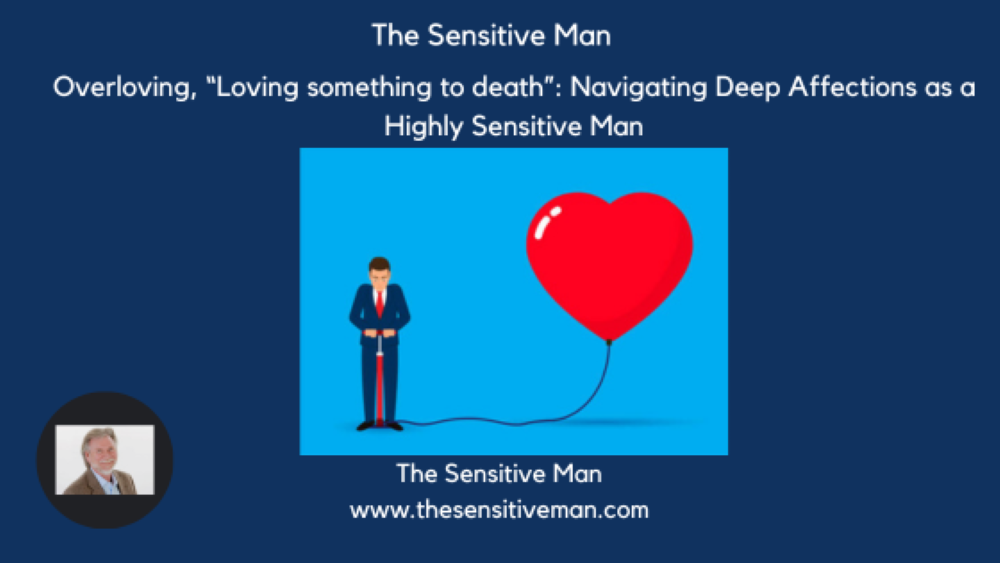|
A Blog about Sensory Processing Sensitivity from the Worldview of a High-Sensing Male
Total words 596, Time to read: 2 minutes 30 seconds Introduction Being a highly sensitive person (HSP) means experiencing the world with heightened depth of feeling. While this trait brings many gifts, such as deep empathy and rich emotional experiences, it also carries the risk of "loving things to death" – when deep affection becomes an obsession that can harm or destroy the object of that affection. For highly sensitive men, navigating the intensity of their emotions and finding a healthy balance in how they express love is crucial for their well-being and the well-being of those around them. Understanding Overattachment Overattachment is an excessive emotional or behavioral attachment to someone or something that goes beyond what is healthy or appropriate. In relationships, it may manifest as excessive neediness, jealousy, or attempts to control a partner's behavior. With hobbies or possessions, it can lead to an unhealthy fixation that consumes time and energy to the detriment of other aspects of life. For HSPs, overattachment often stems from a deep fear of loss, a need for control, and a tendency to seek identity and validation through external sources. As Dr. Elaine Aron, a leading researcher on high sensitivity, explains, "Highly sensitive people tend to form very deep attachments and can become highly invested in relationships, hobbies, or possessions, sometimes to an unhealthy degree." Real-world Examples of Overloving The consequences of overloving can be seen in various real-life scenarios: - Relationships: John, an HSP, constantly sought reassurance from his partner, bombarding her with texts and calls when they were apart. His partner felt smothered and eventually ended the relationship. - Hobbies: Miguel, an avid painter, became so consumed by his hobby that he neglected his work, social life, and personal well-being, leading to burnout and depression. - Possessions: Mark, an HSP with a fondness for vintage cars, spent countless hours and resources meticulously restoring a classic vehicle, but never drove it for fear of damaging it. The Consequences of Loving Too Much Overloving often stems from a genuine place of deep affection, but it can paradoxically lead to the loss or destruction of the very thing one is trying to protect. Strained relationships, personal unhappiness, and a sense of emptiness or lack of fulfillment are common consequences. Research on attachment styles has shown that insecure attachment patterns, such as anxious or avoidant attachment, can contribute to unhealthy relationship dynamics and lower overall well-being. Strategies for Balanced Affections 1. Self-awareness: Recognizing your patterns of overattachment and the triggers that exacerbate these behaviors is the first step towards change. Journaling, self-reflection, and seeking feedback from trusted loved ones can help develop this self-awareness. 2. Setting Boundaries: Establish healthy emotional and physical boundaries in relationships and other areas of interest. This may involve communicating needs clearly, setting limits on time and energy spent, and respecting each other's autonomy. 3. Mindfulness Practices: Mindfulness and meditation can help HSPs manage the intensity of their emotions and foster a sense of detachment from obsessive thoughts and behaviors. "Mindfulness allows us to observe our thoughts and feelings without getting caught up in them," says mindfulness expert Dr. Jon Kabat-Zinn. 4. Finding Diversity in Attachments: Instead of investing all emotional energy into a single person, hobby, or possession, strive to diversify your interests and emotional investments. This can help reduce the risk of overloving any one thing. 5. Seeking Support: Therapists, support groups, and communities of fellow HSPs can provide guidance and understanding in navigating deep feelings and tendencies towards overattachment. Healthy Ways to Show Love and Affection Expressing deep love and affection does not have to come at the expense of respecting the autonomy and freedom of the loved one, hobby, or possession. Communication, understanding each other's needs and boundaries, and finding healthy outlets for emotional expression are key. "True love is not possession, but appreciation and respect," says relationship expert Dr. John Gottman. "It's about cherishing the other person's individuality and allowing them the space to grow and thrive." Conclusion For highly sensitive men, the depth of emotion they experience can be both a blessing and a challenge. Recognizing when deep affection becomes detrimental is crucial for personal well-being and maintaining healthy relationships. By cultivating self-awareness, setting boundaries, practicing mindfulness, diversifying emotional investments, and seeking support, HSP men can learn to love deeply and wisely, without suffocating or destroying the objects of their affection. Reflect on your own patterns of affection and consider implementing the strategies discussed. Embrace the gift of high sensitivity while pursuing balanced and healthy relationships with the people, hobbies, and possessions you cherish. References Aron, E. N. (1996). The highly sensitive person: How to thrive when the world overwhelms you. Broadway Books. Gottman, J. M., & Silver, N. (2015). The Seven Principles for Making Marriage Work. Harmony. Kabat-Zinn, J. (2013). Full catastrophe living: Using the wisdom of your body and mind to face stress, pain, and illness. Bantam Books. Mikulincer, M., & Shaver, P. R. (2007). Attachment in adulthood: Structure, dynamics, and change. Guilford Press.
0 Comments
Leave a Reply. |
AuthorBill Allen currently lives in Bend, Oregon. He is a certified hypnotist and brain training coach at BrainPilots.com. He believes that male sensitivity is not so rare, but it can be confounding for most males living in a culture of masculine insensitivity which teaches boys and men to disconnect from their feelings and emotions. His intent is to use this blog to chronicle his personal journey and share with others. Archives
July 2024
Categories
All
|


 RSS Feed
RSS Feed
